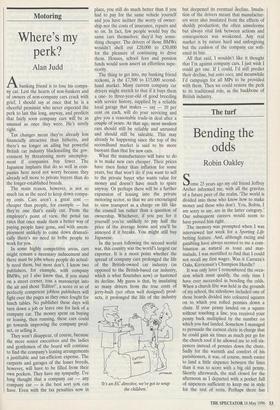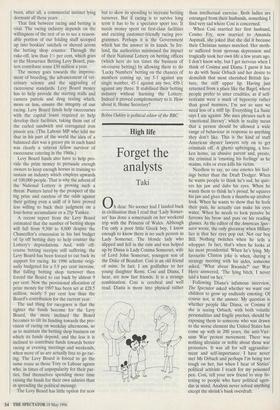The turf
Bending the odds
Robin Oakley
Some 25 years ago my old friend Jeffrey Archer informed me, with all the gravitas of a future peer of the realm, 'The world is divided into those who know how to make money and those who don't. You, Robin, I am sorry to say, are in the latter category.' Our subsequent careers would seem to have proved him right. The memory was prompted when I was interviewed last week for a Sporting Life betting feature. And, although racing and gambling have always seemed to me a com- bination as natural as toast and mar- malade, I was mortified to find that I could not recall my first wager. Was it Carozza's Oaks, Kirriemuir's Champion Hurdle?
It was only later I remembered the occa- sion which must qualify, the only time I have ever succeeded in bending the odds. When a church fate was held in the grounds of my school, the sideshows included one of . those boards divided into coloured squares on to which you rolled pennies down a chute. If your penny landed on a square without touching a line, you received your penny back multiplied by the number on which you had landed. Somehow I managed to persuade the earnest cleric in charge that he could gain six times as much per go for the church roof if he allowed me to roll six- pences instead of pennies down the chute. Sadly for the warmth and comfort of his parishioners, it was, of course, much easier to land a little sixpence between the lines than it was to score with a big old penny. Shortly afterwards, the stall closed for the afternoon as I departed with a pocket full of sixpences sufficient to keep me in style for the rest of term. Perhaps there has been, after all, a commercial instinct lying dormant all these years . . .
That link between racing and betting is vital. The racing industry depends on the willingness of the rest of us to see a reason- able portion of our folding stuff scooped up into bookies' satchels or shoved across the betting shop counter. Through the rake-off, less than 11/2 per cent, which goes to the Horserace Betting Levy Board, pun- ters contribute some £50 million a year.
The money goes towards the improve- ment of breeding, the advancement of vet- erinary science and the upgrading of racecourse standards. Levy Board money has to help provide the starting stalls and camera patrols and drug testing which, more or less, ensure the integrity of our racing. Levy Board funds help racecourses with the capital loans required to help develop their facilities, taking them out of the curled sandwich and corrugated iron pissoir era. (The Labour MP who told me that in his part of the world the idea of a balanced diet was a greasy pie in each hand was clearly a veteran fellow survivor of racecourse catering in the 1960s.) Levy Board funds also have to help pro- vide the prize money to persuade enough owners to keep enough horses in training to sustain an industry which employs upwards of 100,000 people. That is why the advent of the National Lottery is proving such a threat. Punters lured by the prospect of the big prize and careless of the odds against their getting even a sniff of it have proved less willing to back their judgment on a four-horse accumulator or a 25p Yankee.
A recent report from the Levy Board estimated that the number of betting shops will fall from 9,500 to 8,800 despite the Chancellor's concession in his last budget of 1p off betting duty to help counter the Lottery's depredations. And, with off- course betting receipts still suffering, the Levy Board has been forced to cut back its support for racing. Its 1996 scheme origi- nally budgeted for a 5.9 per cent increase. But falling betting shop turnover then forced the Board to cut back by almost 9 per cent. Now the provisional allocation of prize money for 1997 has been set at £28.5 million, nearly 5 per cent less than the Board's contribution for the current year.
The sad thing for racegoers is that the tighter the funds become for the Levy Board, the more inclined the Board becomes to tilt its funding towards the pro- vision of racing on weekday afternoons, so as to maintain the betting shop business on which its funds depend, and the less it is inclined to contribute funds towards better racing at evening meetings and weekends, when more of us are actually free to go rac- ing. The Levy Board is forced to go the same route as those Tory or Labour agents who, in times of unpopularity for their par- ties, find themselves spending more time raising the funds for their own salaries than in spreading the political message.
The Levy Board has little option for now but to skew its spending to increase betting turnover. But if racing is to survive long term it has to be a spectator sport too. It needs money spent on first-class facilities and exciting customer-friendly racing pro- grammes. Perhaps it is the Government which has the answer in its hands. In Ire- land, the authorities minimised the impact of their National Lottery on betting offices (which here do ten times the business of on-course betting) by allowing them to do `Lucky Numbers' betting on the chances of numbers coming up, say 5-1 against any single number, 45-1 against any two, 450-1 against any three. It stabilised their betting industry without harming the Lottery. Indeed it proved complementary to it. How about it, Home Secretary?
Robin Oakley is political editor of the BBC.



































































 Previous page
Previous page